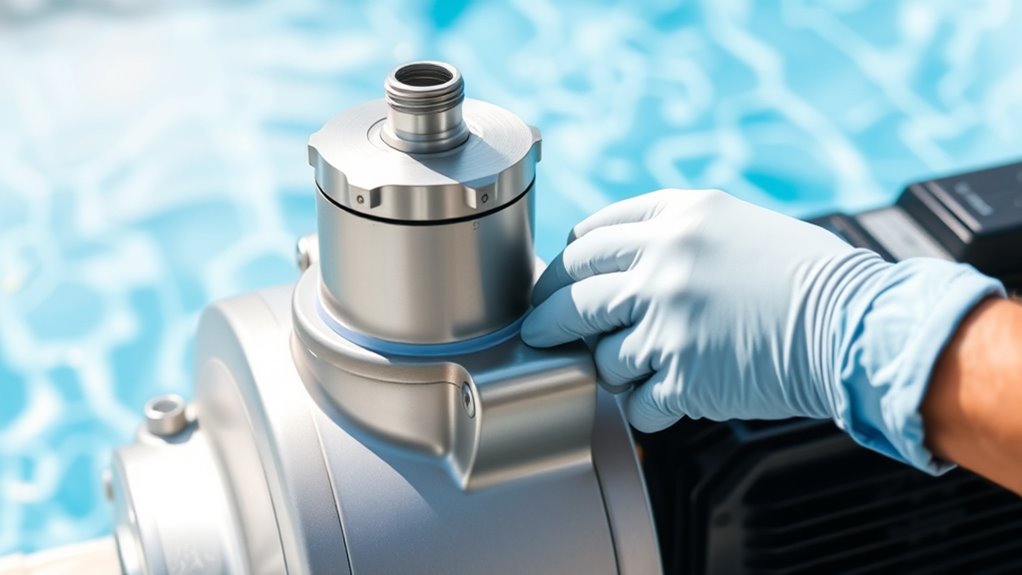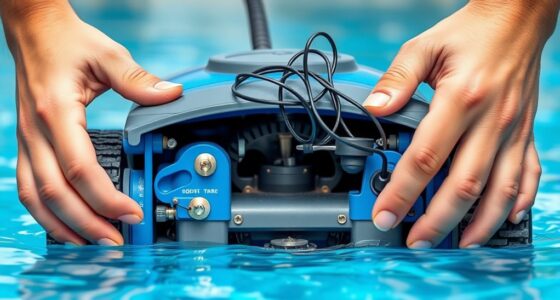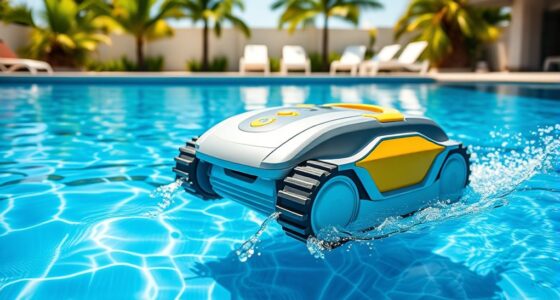If your pool pump is making strange noises or not working smoothly, start by inspecting for debris or obstructions inside the pump basket. Check electrical connections for looseness or corrosion, and listen for grinding or squealing sounds that might mean worn bearings or damaged impellers. Address electrical issues like overheating or loose wiring promptly. For more simple fixes and guides to troubleshoot your pool pump effectively, keep exploring the steps that can save you time and money.
Key Takeaways
- Turn off the pump and check for debris or obstructions inside the pump housing or basket.
- Inspect electrical connections for looseness, corrosion, or signs of overheating, and tighten or clean as needed.
- Listen for unusual noises like grinding or screeching to identify worn bearings or damaged impellers.
- Reset circuit breakers if the pump trips due to electrical overloads, and ensure wiring is intact.
- Perform regular maintenance such as cleaning the filter, lubricating bearings, and replacing worn parts to prevent future issues.

Are you experiencing issues with your pump not operating properly? One of the most common signs that something’s wrong is unusual pump noise. If your pool pump suddenly starts making grinding, screeching, or rattling sounds, it’s likely a sign of underlying problems. Sometimes, these noises stem from mechanical issues like worn-out bearings or debris caught in the impeller. But often, they’re linked to electrical issues that affect the motor’s performance. Electrical problems can cause the pump to run irregularly or not at all, and they can also produce strange noises. Before jumping to conclusions, it’s important to pinpoint whether the noise is mechanical or electrical in origin.
If you notice your pump is unusually loud or making inconsistent sounds, start by inspecting the motor and electrical connections. Loose wiring or corroded terminals can cause electrical issues that lead to abnormal noise levels. Turn off the pump and carefully check all electrical connections, tightening any loose wires and cleaning corrosion with a wire brush or contact cleaner. Also, look for signs of overheating, such as a burnt smell or melted wiring insulation, which can indicate electrical overloads. These issues can trip circuit breakers or cause the motor to draw excessive current, leading to increased noise and potential damage. If you find damaged wires or persistent electrical problems, it’s best to call a professional electrician or pool technician to handle repairs safely.
Mechanical causes of pump noise include worn-out bearings, a damaged impeller, or debris lodged inside the pump housing. To diagnose these, first turn off the power and inspect the pump physically. Remove the pump lid and check for debris or obstructions that could create noise when the impeller spins. If debris is present, clear it out carefully. For bearing issues, you may notice a grinding or squealing sound when the motor runs. Worn bearings often need replacement, which requires some mechanical skill. If you’re comfortable, follow the manufacturer’s instructions for bearing replacement, but otherwise, hiring a professional will save you time and ensure proper installation. Additionally, electric motor issues can cause irregular operation and noise, making it crucial to consider electrical diagnostics as part of your troubleshooting process.
Regular maintenance can prevent many electrical and mechanical problems that cause pump noise. Cleaning the pump basket regularly, checking electrical connections, and replacing worn bearings can extend your pump’s lifespan and keep it running smoothly. If electrical issues persist despite these checks, don’t hesitate to seek professional help. Ignoring electrical problems can lead to further damage or even safety hazards. Addressing the root cause of pump noise early on can save you money and frustration in the long run, ensuring your pool stays clean and your pump runs quietly.
Frequently Asked Questions
How Often Should I Perform Pool Pump Maintenance?
You should perform routine inspections on your pool pump at least once a month to make certain it’s running smoothly. During these checks, look for debris, leaks, or unusual noises. Replace worn parts like seals or bearings promptly to prevent bigger issues. Regular maintenance helps extend your pump’s lifespan and keeps your pool clean. Don’t forget to clean or replace filters as needed, typically every few months, depending on usage.
What Is the Average Lifespan of a Pool Pump?
You might wonder how long your pool pump lasts. On average, a pump motor and impeller inspections reveal that most pool pumps work well for about 8 to 15 years. Regular maintenance, including checking the pump motor and inspecting the impeller for debris, can extend its lifespan. Keep an eye on performance and schedule inspections to catch issues early, ensuring your pump runs smoothly for years to come.
Can I Replace My Pool Pump Myself?
Thinking of replacing your pool pump yourself is like sailing into uncharted waters. While DIY repairs can save money, it’s essential to guarantee the cost considerations and your skill level. If you’re comfortable with electrical work and basic plumbing, you can tackle it. However, if you’re unsure, hiring a professional ensures safety and proper installation. Remember, a wrong move might turn a simple repair into a costly mistake.
What Signs Indicate My Pump Needs Professional Repair?
If your pump makes unusual noise or you notice electrical issues like flickering lights or a sudden loss of power, it’s time to call a professional. Persistent loud pump noise, burning smells, or if the pump won’t start altogether, are clear signs you shouldn’t overlook. Addressing these problems early can prevent further damage and ensure your pool stays clean and safe. Trust a professional to diagnose and fix complex issues properly.
How Do Temperature Changes Affect Pump Performance?
Like a delicate dance, your pump’s performance responds to temperature fluctuations. When it gets too hot or cold, efficiency takes a hit, making your system work harder than it should. Cold weather can cause parts to stiffen, while high temperatures may lead to overheating. Both scenarios reduce pump efficiency, risking damage. To keep your pool running smoothly, monitor temperature changes and guarantee your pump operates within ideal conditions.
Conclusion
By following these simple troubleshooting tips, you can quickly identify and fix common pool pump issues, saving time and money. Did you know that regular maintenance can extend your pump’s lifespan by up to 50%? Staying proactive guarantees your pool stays clean and operational all season long. So, keep an eye on your pump’s performance, and don’t hesitate to tackle small problems early—your pool will thank you for it!










